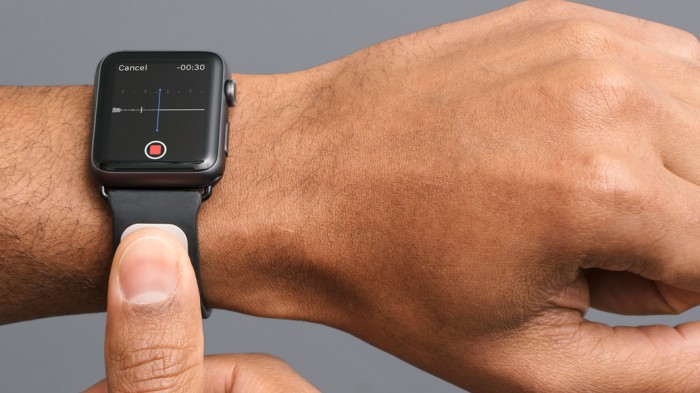The Apple Watch May Be About to Get a Medical-Grade Add-On
It looks like the Apple Watch will soon be getting an accessory that could help people with serious heart conditions.
AliveCor, a startup that works on mobile heart-monitoring technology, says it’s making a heart monitor built into a special watchband that works with a speech-recognition app to log symptoms. The company says its Kardia Band will contain a “medical-grade” electrocardiogram (EKG) that will let users touch the watchband to quickly find out if their heart rhythm is normal or not. AliveCor currently offers a $99 gadget called Kardia Mobile that brings the same kind of sensing to a smartphone via a case or special plate that connects to your handset and an app that lets you send heart data to your doctor.

The company also says it’s working on getting approval from the U.S. Food and Drug Administration for the watchband device, which would make it a rarity — AliveCor CEO Vic Gundotra told Re/code that, should that happen, he thinks it will be the first smartwatch device to receive such clearance.
It’s not yet clear when Kardia Band will be released or how much it will cost, but Re/code reports that an algorithm the company uses to instantly analyze EKG signals has been approved by the FDA and is in a version of the app that was released Wednesday.
Apple Watch already has a built-in heart rate monitor, but that sensor is intended for more casual use like logging daily activity or workouts, not keeping an eye on medical problems. And its readings are not necessarily accurate: some Apple Watch users complained its pulse readings are off the mark for some activities. Apple notes on its website that activities such as tennis that lead to “irregular movements” won’t capture the heart rate as accurately as those that are “rhythmic,” such as running.
In general, building accurate biometric tracking into a consumer device—or in this case, one that works with a consumer device—is not easy. The wrist is not actually the best part of the body for measuring signals like heart rate, due to issues like extra noise from arm movements, difficulty in getting consistent contact with the skin, and variations in things like skin translucency and skin tones.
But since it looks like AliveCor is planning to gather its data not by using sensors on the underside of the band but by having you touch your finger to the sensor embedded in the wristband—as this video on its website indicates—it may have better luck.
(Read more: Re/code, Tech Times, “Health Tracking Startup Fails to Deliver on Its Ambitions”)
Keep Reading
Most Popular
Large language models can do jaw-dropping things. But nobody knows exactly why.
And that's a problem. Figuring it out is one of the biggest scientific puzzles of our time and a crucial step towards controlling more powerful future models.
How scientists traced a mysterious covid case back to six toilets
When wastewater surveillance turns into a hunt for a single infected individual, the ethics get tricky.
The problem with plug-in hybrids? Their drivers.
Plug-in hybrids are often sold as a transition to EVs, but new data from Europe shows we’re still underestimating the emissions they produce.
Stay connected
Get the latest updates from
MIT Technology Review
Discover special offers, top stories, upcoming events, and more.